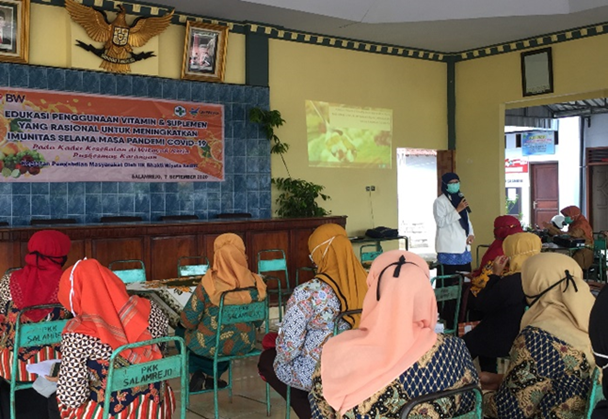Edukasi Penggunaan Suplemen Selama Pandemi Covid-19 pada Kader Kesehatan di Wilayah Kerja Puskesmas Karangan Kabupaten Trenggalek Education on the Use of Supplements During the Covid-19 Pandemic for Health Cadres in the Work Area of the Karangan Health Center Trenggalek Regency
Main Article Content
Abstract
Several ways can be used to boost the immune system, one of which is by using supplements that can be obtained through a doctor's recommendation or pharmacist consultation. Low immunity in humans will make it easy to be exposed to diseases or viruses, including quickly exposure to Covid-19. This is why many people take supplements: they think the amount of minerals and vitamins they get from their food is insufficient to keep their immune system healthy. One of the considerations for taking supplements is knowledge of their benefits. Even though supplements are not drugs, their use must also be rational. Individuals with adequate knowledge, especially about supplements, will tend to choose and use supplements according to conditions and benefits for the body. To find out the effectiveness of counseling in increasing knowledge of the use of supplements to increase body immunity during the Covid-19 pandemic for health cadres in the Karangan Health Center, Trenggalek Regency working area. This community service is conducted through lectures and question-and-answer method counseling. The number of participants in this activity was 33 health workers in the work area of the Karangan Health Center, Trenggalek Regency. Results: There was an increase in knowledge of the use of immunity-boosting supplements in health cadres in the work area of the Karangan Health Center, Trenggalek Regency, from the majority of sufficient knowledge (pre-test) to good (post-test). Education on using supplements can increase the knowledge of health cadres in the work area of the Karangan Health Center.
Downloads
Article Details

This work is licensed under a Creative Commons Attribution-ShareAlike 4.0 International License.
Authors who publish with this journal agree to the following terms:
- Any article on the copyright is retained by the author(s).
- Author grant the journal, right of first publication with the work simultaneously licensed under a Creative Commons Attribution License that allows others to share work with acknowledgment of the work authors and initial publications in this journal.
- Authors are able to enter into a separate, additional contractual arrangements for non-exclusive distribution of published articles of work (eg, post-institutional repository) or publish it in a book, with acknowledgment of its initial publication in this journal.
- Authors are permitted and encouraged to post their work online (e.g., in institutional repositories or on their websites) prior to and during the submission process, as can lead to productive exchanges, as well as earlier and greater citation of published work.
- The article and any associated published material is distributed under the Creative Commons Attribution-ShareAlike 4.0 International License
References
Amalia, L., Irwan, I. and Hiola, F. (2020). Analisis Gejala Klinis Dan Peningkatan Kekebalan Tubuh Untuk Mencegah Penyakit Covid-19’. Jambura Journal of Health Sciences and Research, 2(2) 71–76. https://doi.org/10.35971/jjhsr.v2i2.6134
Aprilyanti, S. (2017). Pengaruh Usia dan Masa Kerja Terhadap Produktivitas Kerja (Studi Kasus: PT. OASIS Water International Cabang Palembang). Jurnal Sistem dan Manajemen Industri1, (2) 68. https://doi.org/10.30656/jsmi.v1i2.41 .
Ardiaria, M. (2020). Peran Vitamin D Dalam Pencegahan Influenza Dan Covid-19’.JNH (Journal of Nutrition and Health), 8(2), 79–85. https://doi.org/10.14710/JNH.8.2.2020.79-85.
Mukti, A,W. (2020). Hubungan Pengetahuan terhadap Perilaku Penggunaan Suplemen Kesehatan Warga Kebonsari Surabaya di Masa Pandemi Covid-19. FARMASIS: Jurnal Sains Farmasi, 1(1), 20–25.
BPOM RI (2019) Peraturan Badan Pengawas Obat Dan Makanan Nomor 16 Tahun 2019 Tentang Pengawasan Suplemen Kesehatan.
Fatimah, D. S. and Gozali, D. (2021) ‘Review Artikel: Peran Zink, Vitamin C dan D dalam Meningkatkan Imunitas Tubuh’, Farmaka, 19(3), pp. 40–47. https://doi.org/10.24198/farmaka.v19i3.34787
Nengah, I.B.S. et al. (2020). Hubungan Usia Dengan Pengetahuan Dan Perilaku Penggunaan Suplemen Pada Mahasiswa Institut Teknologi Sepuluh Nopember. Jurnal Farmasi Komunitas, 7(1), 2. https://doi.org/10.20473/jfk.v7i1.21657
Yani, K.T.P.A, et. al. (2021). Manfaat Suplemen dalam Meningkatkan Daya Tahun Tubuh sebagai Upaya Pencegahan Covid 19. Acta Holist. Pharm., 3(3), 9–21. https://www.ptonline.com/articles/how-to-get-better-mfi-results.
Pratiwi, Y., Rahmawaty, A. and Islamiyati, R. (2020). Peranan Apoteker Dalam Pemberian Swamedikasi Pada Pasien Bpjs. Jurnal Pengabdian Kesehatan, 3(1), 65–72. https://doi.org/10.31596/jpk.v3i1.69.
Susilo, A. et al. (2020). Coronavirus Disease 2019: Tinjauan Literatur Terkini. J Jurnal Penyakit Dalam Indonesia, 7(1), 45–67. https://doi.org/10.25104/transla.v22i2.1682
